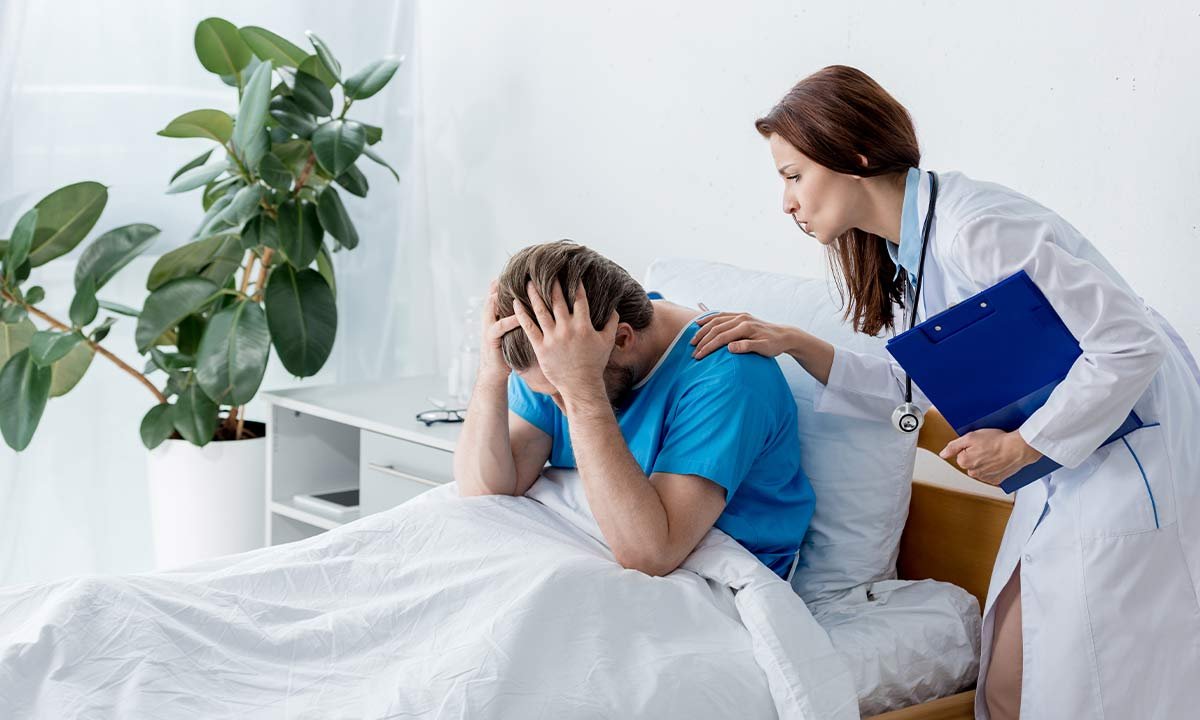
Feeling a sharp pain in your chest can be terrifying—especially when it hits during a moment of panic or high stress. Many people fear the worst: “Am I having a heart attack?” But in many cases, it’s not a heart attack—it’s anxiety.
So, can anxiety cause a heart attack? The short answer is Anxiety doesn't directly cause a heart attack, but it can mimic one and lead to symptoms that feel alarmingly similar. In this article, we’ll explore the connection between anxiety, chest pain, stress, and heart health, and what you can do to manage it.
What Does Anxiety Chest Pain Feel Like?
Chest pain caused by anxiety can be intense and frightening. It may come on suddenly during a panic attack or build up over time due to chronic stress.
Common descriptions of anxiety chest pain include:
- Sharp or stabbing pain
- A dull ache in the chest
- A feeling of tightness or pressure
- A burning sensation
- A fluttering or skipped heartbeat
The anxiety chest pain location is often in the center or left side of the chest and may radiate to the shoulders or neck. Unlike a heart attack, this pain typically goes away with stress relief or calming techniques.
If you’ve ever had a panic attack chest pain, you know how real it feels. The chest pain, combined with racing heart, dizziness, and breathlessness, can mimic a true panic attack heart emergency.
Why Does Anxiety Cause Chest Pain?
When you experience anxiety, your body enters “fight or flight” mode. This response releases stress hormones like adrenaline and cortisol, which can:
- Increase your heart rate
- Tighten your chest muscles
- Disrupt normal breathing
- Narrow your blood vessels
These changes can lead to chest pain due to anxiety, also known as chest tightness anxiety. You may also experience an anxiety feeling in your chest—a heavy or uncomfortable sensation that’s hard to ignore.
Over time, stress causing chest pain can become a frequent problem. Yes, anxiety can cause chest pain every day, especially if you're under constant pressure.
Anxiety vs Heart Attack: How to Tell the Difference
It's important to distinguish between a heart attack and anxiety causing chest pain, though the symptoms can overlap.
|
Anxiety Chest Pain |
Heart Attack Chest Pain |
|
Sharp, stabbing, or localized |
Pressure, squeezing, or fullness |
|
Improves with relaxation or breathing techniques |
Gets worse with activity or doesn’t improve |
|
Accompanied by fear, dizziness, or rapid breathing |
May include sweating, nausea, jaw or arm pain |
|
Often occurs during high stress or panic |
Often triggered by physical exertion |
That said, if you’re ever unsure, seek medical attention. It's always better to be safe when dealing with chest discomfort.
Can Anxiety Cause a Heart Attack?
Technically, anxiety does not directly cause heart attacks. However, chronic stress and untreated anxiety can negatively impact heart health over time.
Long-term anxiety may lead to:
- High blood pressure
- Increased inflammation
- Elevated cholesterol levels
- Irregular heart rhythms
So while anxiety causing a heart attack is rare, it can raise your risk if it contributes to unhealthy habits (like smoking, poor sleep, or lack of exercise) or underlying heart disease. This is why managing anxiety is essential—not just for peace of mind but for physical health too.
How to Relieve Chest Pain Due to Stress and Anxiety
Feeling tightness or discomfort? Here’s how to relieve anxiety chest pain and reduce stress-induced symptoms:
- Practice Deep Breathing
One of the best ways to reduce chest pain stress is through slow, controlled breathing. Inhale deeply through your nose, hold for a few seconds, then exhale slowly through your mouth. This helps calm the nervous system.
- Use Grounding Techniques
During a panic attack, grounding yourself can help you escape the anxiety spiral. Try:
- Touching a cold object
- Naming five things you can see
- Listening to calming sounds
- Stay Active
Exercise improves blood flow and releases endorphins, which reduce stress naturally. Regular activity can help prevent both anxiety chest pain and long-term heart risks.
- Avoid Triggers
Limit caffeine, alcohol, and processed foods, which can heighten anxiety heart symptoms.
- Talk to a Professional
Therapy, especially cognitive behavioral therapy (CBT), is highly effective in treating anxiety and chest pain left side sensations and other related symptoms.
Stress Chest Pain Symptoms to Watch
Some people experience chronic chest pain due to stress without realizing the emotional connection. Watch for these symptoms:
- Pain that worsens with stress
- Tightness when you're overwhelmed
- Chest heaviness that improves with rest or relaxation
If you're wondering "does stress cause chest pain?" or "can stress cause chest pain every day?"—yes, it absolutely can. That’s why emotional wellness is just as important as physical health.
How to Reduce Anxiety Chest Pain Long-Term
Managing anxiety is the best way to prevent stress chest pain symptoms from recurring. Try these long-term strategies:
- Meditation & Mindfulness: Helps regulate emotions and reduce physical tension.
- Healthy Sleep Habits: Poor sleep can worsen anxiety and chest pain.
- Stay Hydrated: Dehydration can intensify physical symptoms.
- Build a Support Network: Talk to friends, family, or join a support group.
- Professional Treatment: Medication, therapy, or holistic approaches can help you manage heart pain due to stress safely.
Final Thoughts
So, can anxiety cause a heart attack? Not directly—but it can feel like one, and it can contribute to heart problems if left unmanaged. Chest pain due to anxiety is a real and distressing symptom, but with the right tools, you can reduce its frequency and intensity.
If you're feeling overwhelmed by panic attack chest pain, stress chest pain, or you're experiencing anxiety chest pain every day, don’t ignore it. You deserve support, relief, and a care plan that treats both your mental and physical health.


